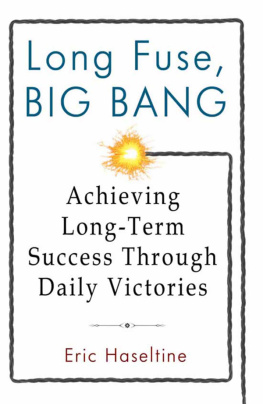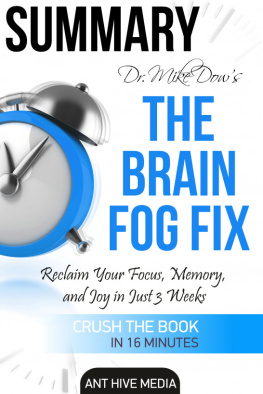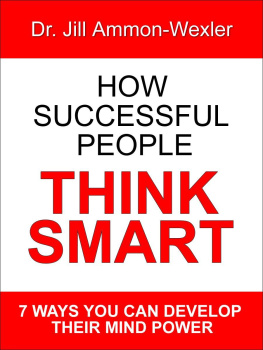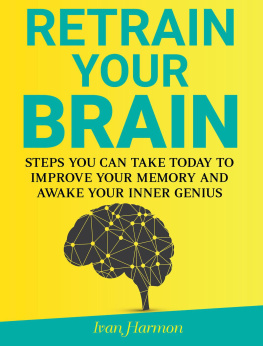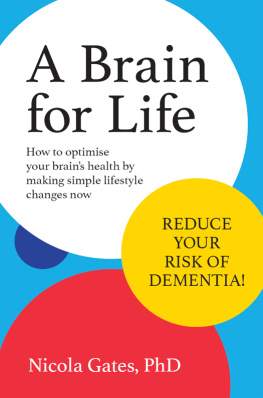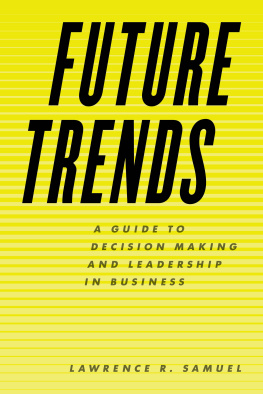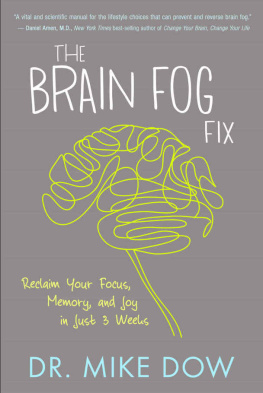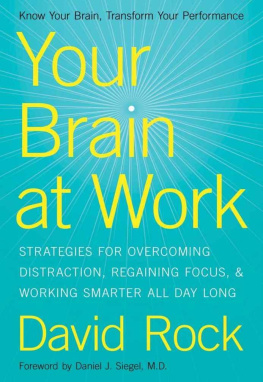F OR S TACEY
Hard work pays off in the future, laziness pays off now
Steven Wright
Contents
Introduction
Why You Shouldnt Buy This Book
As one part of your brain processes the words of this introductionconverting black symbols on a white page into meaninganother part of your brain is urging you to put the book down and focus on something more pressing. Get back to work on the budget due tomorrow. Answer emails growing stale in your inbox. Get off your rear and update that rsum.
Even if youve already bought the book, odds are that the constant tug of here-and-now demands will stop you from finishing it. Most people who buy business books, even best sellers, never read themmuch less complete thembecause something more pressing always comes along.
Thats where Long Fuse, Big Bang - comes in. This bookyes, the very one you are holding in your handscontains new and important ideas on how to generate explosive results in your professional world. But because none of these ideas requires urgent action, your first-things-first brain will compel you to park the book on a shelf where youll get to it later. - But in all likelihood later - will never come, because your brain wont let it. Take it from me, a neuroscientist: left to its own devices, your brain will forever forsake important pursuits in order to handle more urgent ones.
Dont feel too sheepish about being shortsighted, though, because evolution has hardwired our brains to have temporal myopia, the tendency to focus only on the immediate future. For instance, I dont know any executivesincluding some Fortune 500 CEOswho think they spend as much time as they ought to fostering long-term, game-changing advances in their businesses. These leaders lament that the constant need to react to emergencies interrupts and derails their efforts at transformative change. You cant focus on tomorrow, so the thinking goes, without sacrificing today.
But this thinking is wrong.
Its an unconscious holdover from a timehundreds of thousands of years in our pastwhen our environments were so filled with immediate peril and our life expectancies so short (around twenty years) that focusing exclusively on surviving right here, right now - made sense.
That was then and this is now.
Long Fuse, Big Bang - shows how, in the modern world, where life expectancies are long and physical perils rare (at least for people who buy books), its possible not only to build a strong tomorrow without sacrificing today, but to actually increase - the number of here-and-now victories by pursuing distant wins.
The first step is to learn how ancient survival scripts compel us to focus all attention on immediate threats and opportunities, creating a false sense of urgency. Armed with this insight, we can prevent our brains from getting in the way of progress. But Long Fuse, Big Bang - doesnt stop after showing how to neutralize your brain as an enemy: the book goes on to illustratethrough case studies of successful long fuse thinkershow to turn our brains into major allies - in the pursuit of major progress.
Some of these case studies come from my strange and varied career as a brain scientist, aerospace manager, Disney executive, and recently, one of Americas most senior intelligence officers. Other stories are drawn from history, or visionary leaders such as Sam Walton, Lou Gerstner, or Jean Monnet, who, without realizing it, perfected the application of neuroscience to achieve big bang results.
And you can do the same if you only convince your got-to-have-it-all-right-now brain to put off instant gratification long enough to start the first chapter. Turning this page will be like lighting a match; one that ignites a long fuse to big bang results in your not too distant future.
Chapter 1
The Ancient Script
CAPABILITIES AND INTENTIONS
Flying low and fast to thwart insurgents surface-to-air missiles, our Blackhawk headed south over the desert toward Hillah, the site of ancient Babylon. I adjusted the five-point harness that held me in the helicopter, twisting in my seat to get a better look at the barren terrain below. The Blackhawks doors were open, filling the cabin with a frigid, howling wind that made conversation impossible. But the openings gave our gunners an unobstructed field of fire and afforded me a panoramic view of Iraq. I surveyed the landscape and thought about the war.
I was an intelligence officer on a three-week visit downrange, as we called combat zones, to help defeat the growing threat of improvised explosive devices, also known as roadside bombs or simply IEDs. The number and sophistication of IED attacks had been climbing since the previous March, and Coalition casualties were mounting. I led a team of scientists researching new ways to cope with the constant improvements insurgents were making to these devices. But gazing at the ancient land below, I wondered whether historic forces would limit my team to temporary successes. The local population had fought occupying powers on and off for more than two thousand years, and the current insurgents showed little sign of quitting. Moreover, tactics for using IEDs had been improving since the early nineteenth century, when guerrillas in Spain first buried roadside kegs of gunpowder, to attack Napoleons convoys. Since that time, insurgents from Northern Ireland to Lebanon had successfully used IEDs to harass and sometimes expel larger, better equipped occupying armies.
One of the lessons resistance fighters had learned since Napoleons occupation of Spain was that by changing the time, place, or method of attack, they could keep defenders off balance. Extremists in Iraq seemed to have absorbed this lesson quickly. Early in the war Coalition Forces were able to spot IEDs from signs of recent digging, so insurgents got smarter, hiding their bombs in roadside trash, hollowed-out cement curbs, and even dead animals.
Its not these latest IEDs were up against, I thought. Its two thousand years of culture and two hundred years of learning about how to use IEDs. Clearly, my team and others trying to defeat these resistance fighters were locked in a spiraling contest of move, countermove, and counter-countermove for as long as the war lasted. What we needed, I realized, was not an endless series of quick, temporary fixes, but fundamental and enduring changes to the way the IED game was played, changes that would tip the odds in our favor. As our helicopter flew over a small settlement of earthen huts, I saw a woman wearing a deep purple burka, feeding goats in a fenced yard. The vivid color of the womans clothes stood in stark contrast to the pale desert around her. She looked up, smiled, and waved as we sped past. Looks like they dont all hate us, I thought. And then it struck me: What if my scientists were taking the wrong approach? What if others here didnt want to kill us? Wouldnt that be a better answer to IEDs than any technology my team could develop?
Intelligence organizations everywhere have two basic goals: to understand the intentions and the capabilities of foreign powers. What are foreign actors trying to achieve and what tools do they have to achieve it? My scientists had been focusing on the capabilities of new IEDs, not the overarching intentions of the extremists who used them. If there was a way to understand the motivations of different individuals who funded, assembled, planted, and triggered the bombs, perhaps we could persuade them not to attack our convoys in the first place. Then, my scientists wouldnt get dragged into an endless circle of defeating insurgent IED technology, only to have the insurgents adapt to our adaptations... and so on and so on.
Others in the Intelligence Communitysixteen different agencies that include CIA, NSA, and intelligence groups of the armed serviceshad been exploring questions of insurgent intent from geopolitical and economic points of view. These officers concluded that insurgents used IEDs for a variety of reasons, ranging from advancing jihadist ideology to simply earning a living. But I was unaware of any significant work on the behavioral science of the struggle against insurgents or Islamic extremists that would lay bare these motives, never mind help us to understand them.

